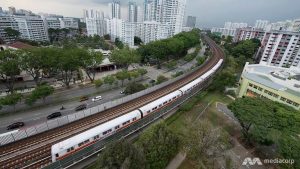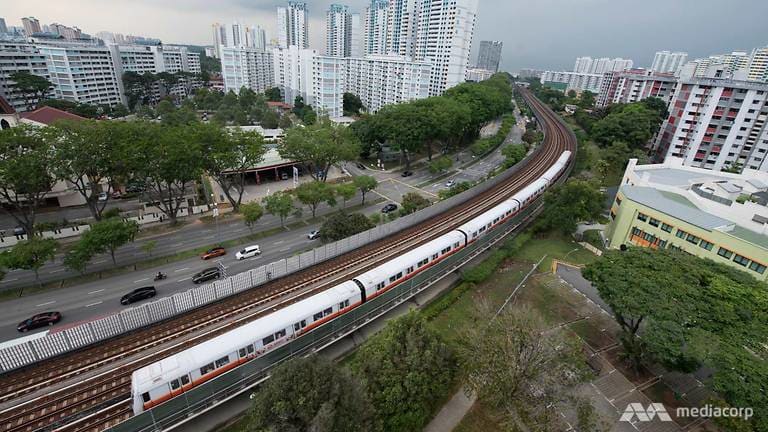
File photo of an MRT train against a backdrop of HDB blocks in Singapore.
SINGAPORE: Singapore is still sticking to its planned expansion of the MRT network to 360km by the early 2030s, although there will be some delays as COVID-19 affects the availability of construction workers, Transport Minister Khaw Boon Wan said on Monday (Jun 22).
“Our plan is to expand the MRT network to 360km by the early 2030s. We are sticking to this plan,” said the minister.
“There will be some delays because of COVID-induced impact on the availability of construction workers,” he added. “But the intent to significantly expand our MRT network remains unchanged.”
Although COVID-19 has disrupted demand for public transport, this impact is temporary, said Mr Khaw.
The pandemic will pass and demand for public transport while recover, said the minister, adding that demand for train services has recovered to “about 40 per cent of pre-COVID level”, amid an easing of local movement restrictions.
Mr Khaw also elaborated on the current state of discussions with Malaysia on the cross-border Kuala Lumpur-Singapore High-Speed Rail and Johor Bahru-Singapore Rapid Transit System (RTS) Link projects, noting both are ongoing despite the COVID-19 situation.
“In fact, the RTS Link discussions, over tele-conferencing, have been intensive, often running into the night, as the negotiators are mindful of the end-July deadline,” said Mr Khaw.
“This is the final extension, and the window is closing. I hope that there will be a successful outcome, so that we can re-start the project implementation.”
The RTS Link project was meant to be completed in 2024. Mr Khaw announced last month that Singapore had agreed to extend the suspension of the RTS Link for a “third and final time”, to Jul 31.
RAIL RELIABILITY IMPROVES IN 2019
Singapore’s MRT network managed to hit 1.4 million km between delays of more than five minutes in 2019, surpassing the reliability target set by the minister three years ago.
This puts Singapore’s rail network on par with leading metro systems around the world, such as those in Hong Kong and Taipei, which have managed to surpass one million km between delays in recent years.
Announcing this on Monday, Mr Khaw noted that the 33-year-old East-West Line (EWL) showed the greatest reliability last year.
One of Singapore’s oldest lines, the EWL clocked 1.48 million km between such delays, more than tripling its reliability since 2018, when it achieved only 0.41 million km.
Rail operator SMRT Trains – which operates the EWL as well as four other rail lines in Singapore – was presented with two awards by the transport ministry for its achievements.
“The East-West Line has come a very long way, especially from the 2017 train collision incident, for which all of us would never forget,” said Mr Khaw, who is also the Coordinating Minister for Infrastructure.
In November 2017, a moving train collided with a stationary train at Joo Koon station on the East-West Line, injuring 38 people.
The incident was later found to have been caused by a software glitch in the then-new signalling system.
That year also saw a major flooding incident on the North-South Line, which disrupted services for more than 20 hours, costing more than S$2 million in delays.
Singapore’s rail network had been plagued by disruptions for several years prior to that.
“The turnaround of EWL is a good story, that no matter how low we have fallen, with determination, we can rise again, to emerge stronger,” said Mr Khaw.
DECOMMISSIONING OF FIRST-GENERATION TRAINS
The minister was speaking at an event marking the start of the decommissioning process for 66 first-generation trains for the North-South and East-West Lines.
Singapore’s oldest MRT trains, manufactured by Japanese firm Kawasaki Heavy Industry, will be gradually replaced by a new fleet of 66 trains starting next year.
“The new trains, which are manufactured by Bombardier, will incorporate commuter-friendly features such as more open spaces for strollers and wheelchair users, train-borne gap fillers for safer boarding and alighting, as well as refreshed LCD screens displaying train travel information,” said the Land Transport Authority (LTA).
The trains will also contain an integrated suite of condition-monitoring features and sensors to facilitate the detection of emerging faults, the authority added.
“This will allow the rail operator to make more efficient use of maintenance resources to pre-emptively rectify potential faults before they affect commuter service.”
LTA added it was in discussions with “several public and private organisations, such as schools” to keep a number of decommissioned trains for training and education purposes, saying that some may be converted into recreational spaces.



